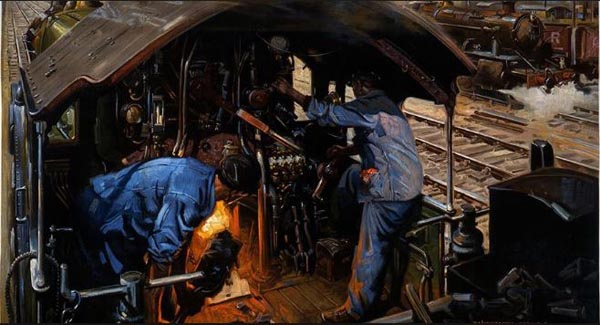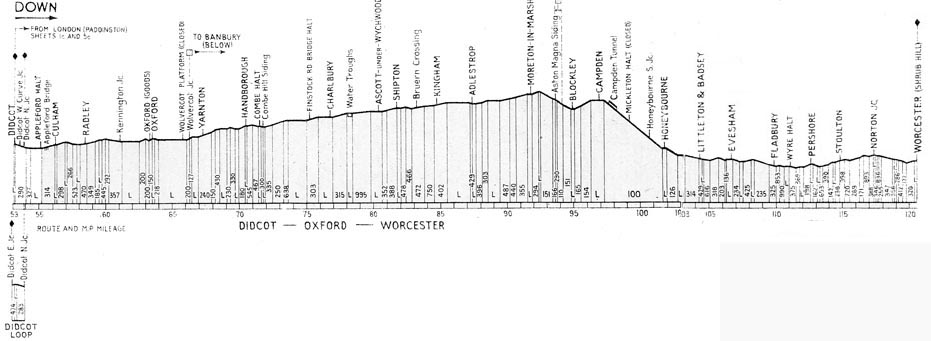
|
In which I continue my
third year at Reading University and ride a Castle to Worcester and
back.
On the Runners - Branchline, November 1988 A Castle on the Worcester Road - Steam Days, May 1993.  Again not much has been happening recently. I took Jane Holland to see a performance of “The Gondoliers” but I don't think I shall go out with her again. I must say it is nice being free. I think I have been able to work a footplate pass for a passenger train. I won first place in the operatic society's draw - £4. Very handy indeed. I went down to the local depot where I worked last vacation. Everybody seemed to be quite pleased to see me.
Saturday
3 November Monday
5 November Tuesday
6 November. Tuesday
13 November Wednesday
14 November Saturday
17 November Wednesday 21 November
A red letter day today. I managed to get a footplate pass on the
Reading to Worcester line. I was told that a footplate inspector
would come with me and I was a bit apprehensive as to who he would be
and what he would be like. I had no need to worry, however, as it
turned out to be Colin Lewis who had instructed me at firing school
back in the summer. (The last time I had seen him, he told me to
clean a gauge glass, then he put a wrench through it and said "Very
good, now change it") The train was the 09.56 ex-Paddington stopping at
Oxford, Kingham, Moreton-in-Marsh, Evesham and Worcester. We
returned on the 13.10 which stopped at the same stations and carried on
to Paddington.  Engine
No 7037 "Swindon"
Driver Barker and Fireman Cox (of Didcot) Reading to Oxford. Driver Crocker and Fireman Dennis (of Worcester) Oxford to Worcester.
Temporary speed restriction
at Fladbury 25 m.p.h.
Engine No.7005 "Sir Edward Elgar" Driver Smith and Fireman Heath from Worcester shed
Signal stop Wolvercot Junction and all signals to Oxford North. Both of these engines are
from the last series of Castles, No. 7037 being the last one of the
class (appropriately named too). "Swindon" was not in too good
condition externally, the paint was scratched and she was dirty.
Besides this, there was steam coming from both outside cylinders and
the regulator gland at the back of the firebox was blowing
through. Never-the-less, she moved the train pretty smartly
. From a two minute late departure from Reading we were back
on time at Didcot and kept time all the rest of the journey. The train
is only allowed 38 minutes from Paddington to Reading so it is hardly
surprising that she was a bit down. The fireman let me have a go on the
shovel almost straight away and I didn't get a chance to look at the
scenery for the first part. I wasn't too sure when and where to
fire and didn't do too well. By Didcot Fireman Cox took over and
carried on to Oxford. The driver was a bit heavy on the lever
with the result that she was using more steam than necessary. The
regulator was just kept open and I doubt if the main valve was used
very much. Steam pressure didn't drop below 180lbs. per sq. in.
(no thanks to me). At Oxford it was apparent from the start that
the crew used a different technique. The driver notched her up a bit
more and firing was easier. The fireman got the fire into good
shape with a few shovelsful and I was allowed to take over the shovel
again. I didn't muck things up this time and Fireman Dennis only
took over again when we reached Evesham so that he could work the fire
down as the engine went on shed at Worcester. Both engines
were fitted with the more modern automatic lubrication with an
indicator in the cab. The cab indicator was not working on 7037
and the alert Driver Crocker noticed this straight away as soon as he
opened the regulator.
We went through Campden Tunnel with the regulator closed and the train accelerated from 65 m.p.h. to 85 m.p.h. This was the first tunnel I have been through on the footplate and it was quite an experience. The sound is quite loud but the biggest impression is the effect of the light from the fire. The smoke and steam comes back and flows just over the top of the tender and is lit up from underneath. Quite something. There was quite a bit of snow on the Oxford side of the tunnel but it didn't rain or snow at all. It was quite cold, however, and the exhaust quickly condensed leaving clouds of billowing white steam. At Worcester we went into the canteen to have a snack and a cup of tea. Walking down the platform on the way to 7005 the fireman saw us coming and called across to his mate who came over to see who they were going to have to put up with. The fireman was very quiet but he knew his job alright and had a good fire built up. The engine was in better condition externally and had just been cleaned. She was a good runner as well but rather heavy on the coal, the driver said she was reputed to be the heaviest engine on coal in the whole class. Besdies this the exhaust steam injector was a bad one and was used only once on the whole journey. We left Worcester on time but were three minutes down at Kingham (station work). All the lost time had been recovered by Yarnton but the run was spoiled by a signal stand north of Oxford waiting for a train from the Banbury line. By this time there was some steam coming on to the footplate from under the fall plate. This turned out to be the steam heating joint. At Reading Inspector lewis phoned Old Oak Common to get it repaired for their return working, the 19.15 Paddington to Worcester. Going over Charbury troughs Colin Lewis offered to operate the water scoop. The water comes at quite a force and it takes something to screw the scoop up again. In the cold, he lost his grip on the screw handle and overfilled the tank with the result that water came out of the overflows and flooded the first coach. Not only that but there was a gurgling sound and a cascade of water came over the coal and flooded the footplate bringing with it a mass of coal. The fireman had been watching this and as soon as he saw the scoop wind itself down out of control he grabbed the coal pick and opened up the fall plate to let the water escape. I jumped up onto the firemans seat and saved myself from getting wet. He then calmly handed the shovel to the inspector suggesting that he might wish to clean up the mess he had made. I think he was secretly pleased that an inspector had made a bloomer. We were 12 minutes down from Oxford but had made two of these by Reading. I didn't do much firing on the way back partly because it was a more difficult schedule and also because the fireman didn't seem too keen. At one point I had put one shovelful wrong and he got out the pricker and pushed down the slight hump I had unwittingly made. Colin Lewis was quite cold standing behind the driver but let me stand by the side of the boiler on the fireman's side which was quite warm. It was quite pleasant from Worcester to Campden tunnel and the sun shone quite brightly but from there back it became quite murky and a bit overcast. Main line running is quite a bit different from what I have been used to, the fireman is on the go all the time. Between Oxford and Reading the fireman was firing continuously without stop. As we approached Didcot North, he stood up and sighted the signals which the driver could not see from his own side, gave the alright and then went back to firing. The fireman knew instinctively exactly where he was without having to look out. There isn't a great deal of room, especially with four up and it can get pretty cold. When the engine is working hard, as, for example,climbing up to the tunnel on the up journey, sand was used in the tunnel to stop slipping. The sound is not so loud as somebody on the platform might imagine it to be. I suppose this is because most of the sound reaches the footplate through the firehole and there is a hollow sound to each beat, rather like a 'woof, woof." Besides this, the sound that can be heard when the regulator is opened can only be described as churning. There is very little movement from side to side caused by the cylinders, especially on a four cylinder engine, but there seems to be that sort of sensation somehow. Friday
23 November Saturday
24 November Sunday
25 November Thursday
29 November 
|